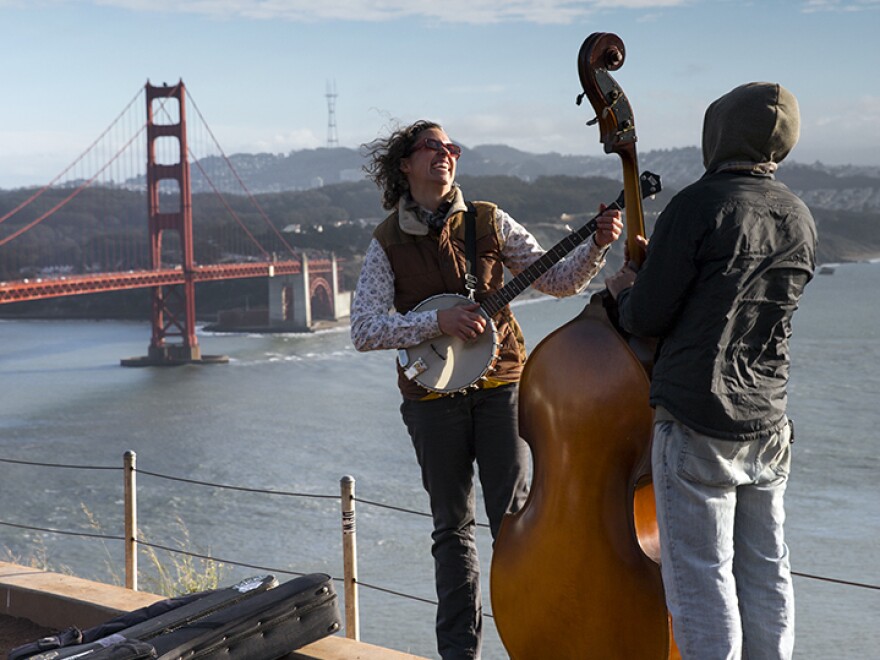Editor's note: In the audio of this story, as in a previous Web version, musician Jalan Crossland suggests making a cake by using an Altoids tin and wiring it to a car battery. Crossland now says he was joking. To be clear: This should not be attempted. Connecting anything to vehicle battery terminals other than the battery cables themselves is dangerous: It could cause a fire and, potentially, damage to the vehicle or injury to drivers and passengers. Here are some better ideas.
For most of us, a road trip is a fun summer adventure — a time away from work, gorging yourself on gas station junk food, listening to audiobooks and your favorite songs.
But the situation is different when being on the road isn't your vacation, but actually part of your livelihood. Subsisting on fast food and sleeping at hotels isn't healthy or economical when you're doing it more often than not.
Many musicians spend their lives on the road. And the ones who want to stay healthy and keep their wallets intact have developed some tricks of the trade.
And keep in mind, try these methods at your own risk — we can't testify to their safety.

Banjo player Sharon Martinson has spent the past six years driving across the U.S., performing as The Littlest Birds. On tour, Martinson logs about 6,000 miles a month. Most years she spends as much time traveling as she does at home.
Even with all that time on the road, she says she's hardly ever stayed in hotels, and she's never stopped for fast food.
"If you're sitting and you're driving a lot, you don't really need to eat," she says. "Mostly you're eating because you're bored."
But when it's finally time for a bite, Martinson packs plenty of water and a cooler with ice, fresh fruit and healthy snacks. Dried foods are key as well.
"I do have a whole section of a bag that's just things that require only hot water," she says, "because you can stop at a gas station and there's always hot water for free. There's always the coffee station, and there's always a hot water spigot."
To make oatmeal, for instance, she recommends using containers with snapping lids and keeping some utensils handy.
Burritos à la moteur
You can even do some types of cooking with your car itself. Exhibit A: engine block burritos.
Before she heads out, Martinson makes burritos, wraps them in foil, and stuffs her freezer full of them. Later, when it's time to thaw them, she uses an engine that's still warm after she stops her car.

"You've been driving, so you pop open the hood, and find a place on the engine block, preferably touching metal," she says. "I'd probably give it 20 minutes to go from frozen to thawed to cheese nice and melty and delicious."
Another engine block recipe comes from Jalan Crossland, another Wyoming musician who spends much of his time behind the wheel.
First, wrap potatoes, carrots, onions and seasonings in foil. "And you just put it on the intake manifold on the motor, and after a while, you'll have a perfectly cooked little stew," he explains.
"Carbecue" isn't limited to musicians. There's a book dedicated to the craft. And aficionados have videos demonstrating how to make everything from shrimp and potatoes to beans to steak and mushrooms.
If you have to restock on supplies, Sharon Martinson recommends farmers markets.
"It's a nice way to see a slice of the community, eat what's local and fresh and in season, and get to mingle with folks who are also at the farmers' market," she says.
When it's time to turn in for the night, Martinson and Crossland both recommend skipping the hotel and instead camping on public land, like a national forest. But if there isn't a grassy spot nearby, head for the asphalt.
"The truck stops and the Wal-Marts," he says. "Everybody knows that those are the places to go. The lull of the semis idling puts you to sleep real nice, and then the fumes keep you that way."
Assuming you wake up the next morning, take the scenic route, stop at the historical markers, and embrace the open road.
Copyright 2021 Wyoming Public Radio. To see more, visit Wyoming Public Radio. 9(MDAxODg3MTg0MDEyMTg2NTY3OTI5YTI3ZA004))


